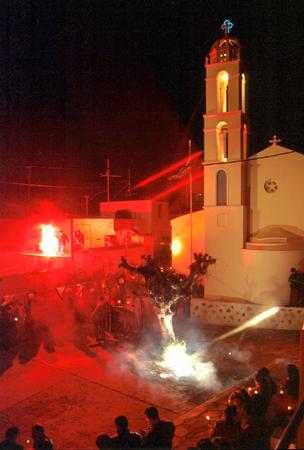
January, February, March celebrations
The activity in the Greek islands revolves around the seasons of the year and is full of religious festivals or panyria.
Orthodox Easter is the most important celebration, although fun carnivals are also celebrated on some islands.
The Greeks know how to combine piety with pleasure very well and put a lot of enthusiasm in their celebrations from the most momentous to the smallest of them.
Some of these festivals have their origin in pagan traditions, others commemorate different harvests: vine, olives, corn or they recreate the victories of the Greeks in their endless struggle for independence.
JANUARY:
January 1 is New Years Day and the feast of Ayios Vassilios and they do it with religious services and the preparation of a special bread (Vassilopitta) in whose mass a coin is inserted and it is said that whoever finds it will be lucky all year.
Carnivals are held over three weeks and culminate on the seventh weekend before Easter.
The Patra carnival with a parade of floats and costume party is one of the most famous in the Mediterranean with events that take place from January 17 to "Clean Monday" ( Kathari Deftera) on the last Sunday before Lent there is a great parade.
Also very attractive are the boúles or mask parties that take place in Macedonia and the "Dance of the goat" in Skiros.
MARCH:
March 25 independence day and evangelism. National holiday that is made with parades and dances throughout the country, which celebrates the revolt of 1821 against the Ottomans.
As for the religious celebration, one of the most important of the Orthodox church, since the annunciation of the Archangel Gabriel to Mary is remembered.
APRIL:
Holy week is comingMegali Evdomada): Palm Sunday (Kyriaki ton Vaion) holy Thursday (Megali Pemptti) Holy Friday (Megali Paraskevi) Holy Saturday (Mega Sabato).
The Greek Orthodox Easter can be up to three weeks before or after the Catholic is the time when the families of Greece come together, it is a wonderful opportunity to visit the country and enjoy the processions and services and taste the paschal food.
The ceremony and performance are directly connected to Greece's Byzantine past and to the oldest beliefs.
The flower-covered coffin of Christ is carried in a solemn procession through the streets on Good Friday night, candles are lit after Mass on Easter Saturday.
The temple is in total darkness at first and a single flame serves to light the others, the festivities come to an end at midnight on Easter Saturday when the priests announce that Christ has risen (Hristos Anesti) and fireworks announce a great banquet, music and dance.
Sunday roast beef heralds the end of the Lenten fast and reaffirms the belief in the renewed life that spring brings.
I saw that in a comment they asked about the day of the oji, it is the day in which the Greek people said no to the Nazis
We are going to see ... this page is really a page of the Greek festivals
THERE ARE ONLY THESE?
ttttttttttttttttt
BYE
ferkhfre htjrk thrjekthre !!! Goodbye
hhhhhhhhhhhhhhh hhhhhhhht tr eyte 12321321321.ADES
buuuuu !!! #yosoloquriaserpopular
what party is celebrated in May